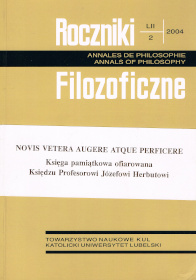Inquiries on the History of Philosophy versus Historicism
Abstract
Is the history of philosophy one of philosophical disciplines? Should not one give up pursuing the traditional history of philosophy on behalf of the history of philosophical culture as a historical discipline? Considerable divergences in defining the history of philosophy and its relation to philosophy and history show profound differences in the views on philosophy itself. The differences are an essential part of the history of philosophy. This paper does not intend to give a critical assessment of all positions that concern the relationship between the history of philosophy and philosophy. We shall address the issue of consequences of historicism that bear on the history of philosophy. The main negative point of reference will R. Rorty's standpoint, which is representative of the radical version of historicism. The American neo-pragmatist's manners of pursuing philosophy and the relations between them will be submitted to criticism. In the perspective of radical historicism (historical and cultural relativism) the inquiries on the history of philosophy have no strictly philosophical importance. They may be cognitively interesting only from the historical point of view, for the history of culture, to be precise. Moderate historicism does not mean acceptance for the relativistic theory of truth. It makes us reconsider the issue of the difference between true knowledge and adequate knowledge, the difference well-known in tradition. Overcoming radical historicism prepares grounds for the pursuit of the history of philosophy as a philosophical discipline, the discipline that studies the history of philosophical problems in their variability and permanence.
Copyright (c) 2004 Roczniki Filozoficzne

This work is licensed under a Creative Commons Attribution-NonCommercial-NoDerivatives 4.0 International License.





